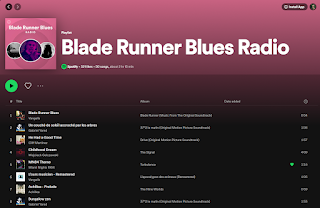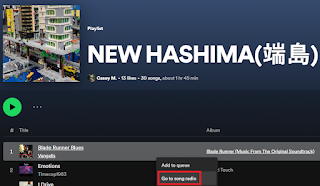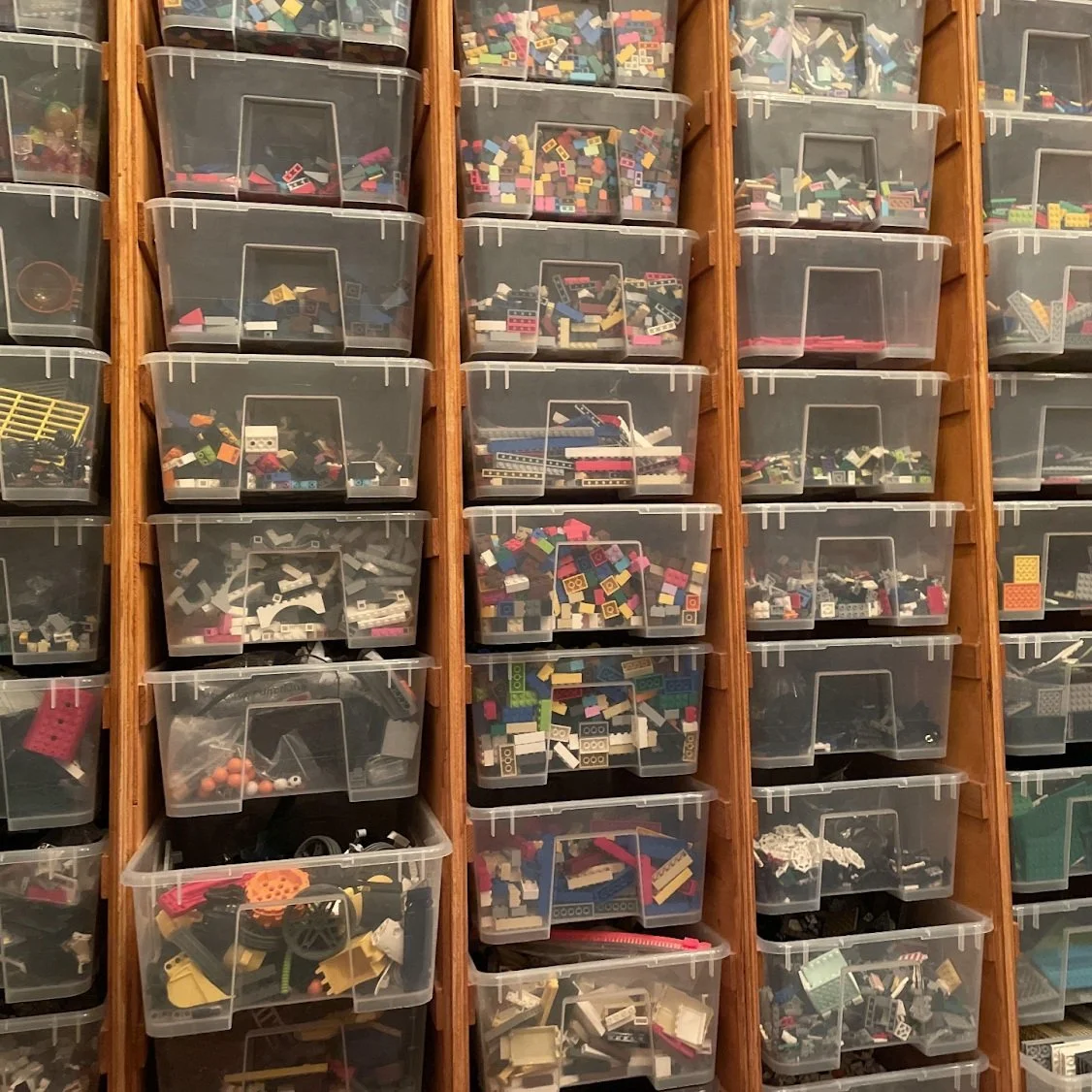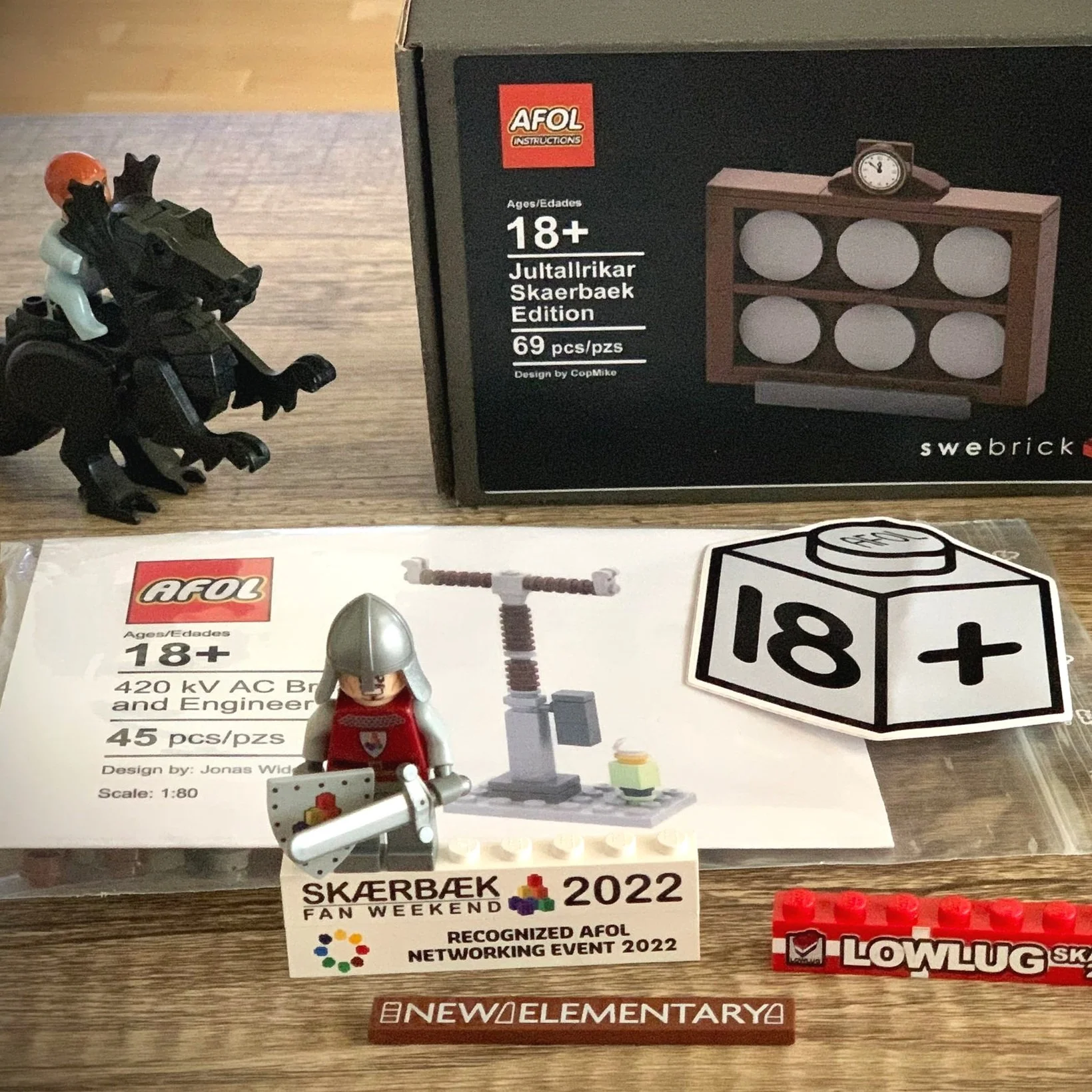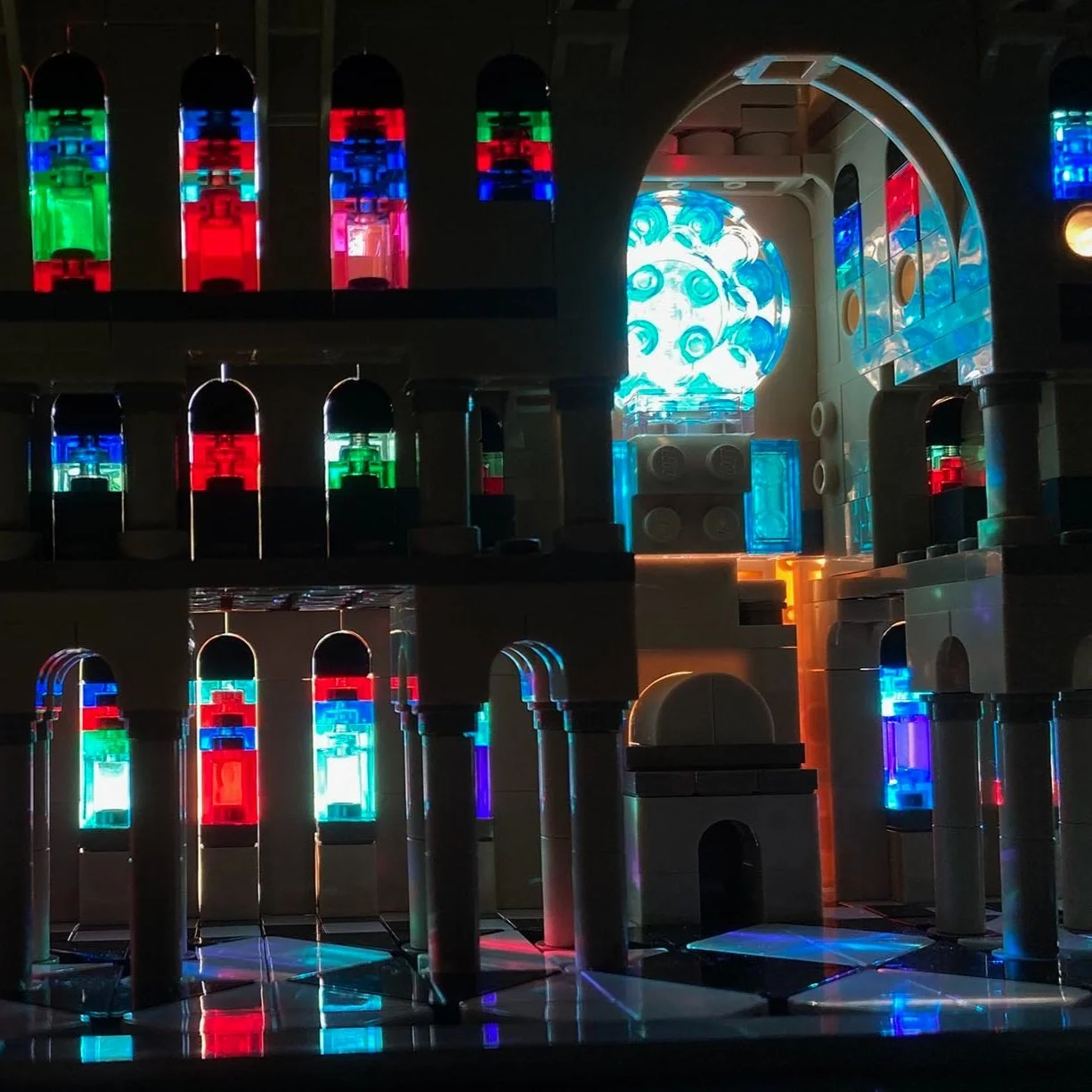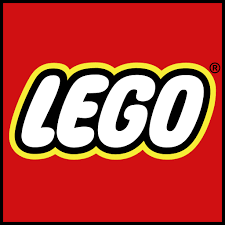Music in MOCs: Crafting the Sonic Landscape of New Hashima
/Today’s New Hashima takeover article comes from Brickworld Master Casey McCoy (Flickr/Insta) who takes us on a musical journey from the one-song soundtrack of his first display to the epic night and day playlist designed for the massive cyber-city collaboration.
Prologue: The Mistakes of My Youth
I was a budding young TFOL embarking on an ambitious collaboration with my best friend for Brickworld 2013 - Hershel’s Farmhouse from The Walking Dead Season 2. Somewhere along our many build sessions set to Ed Sheeran’s LEGO House, the idea was hatched to play The Walking Dead’s title theme alongside our homestead projecting from the inside out. It seemed logical enough, set the tone for our build, and grabbed our audience's attention. Only one problem in hindsight: we only looped a 1-minute and 40-second song.
We left that title song on repeat for nearly four days straight. Our kind, GBC-troubleshooting, neighboring AFOLs never said anything throughout the duration of the show, but in hindsight, I can’t imagine they ever wanted to hear that tune or look at a zombie ever again. Despite being a decade ago, the cringe never goes away. Time does not heal all wounds.
Lesson learned: if you have a sonic component looping for your build that’s not purely ambiance (clapping, cheering, sound effects, etc.), have a musical loop of at least 10 minutes. This is for the sanity of yourself, your fellow builders, and the public attendees. Turn it off when you leave the hall for the night. Too much of a good thing and you’ll be sick of it eventually. That begs the question: why add music to your build at all? How do you do it right?
Music in LEGO Builds
There are a lot of good-intentioned reasons to add music to your LEGO display. It can:
Add another dimension of the human senses for your art to be experienced.
Grab the attention of your audience, whether fellow AFOLs or the public, especially if it's from popular culture.
Set the tone, ambiance, and feeling of the build.
Communicate a story element efficiently in an otherwise difficult scenario.
However, implementation should be measured in both thoughtfulness (e.g., is it a superfluous addition to a build that doesn’t truly need it?) and volume (e.g., am I going to annoy everyone by staging a rave in the display hall?). This is the golden rule I learned: to have some self-awareness and basic respect for your fellow displayers. Now a decade later, I could finally redeem my past sins. Enter New Hashima.
Part 1: Setting the Mood for a Finished Build
In New Hashima’s case, the display oozes its own unique array of subcultures with hundreds of stories, scenes, and freeze-frame moments across the Docks, Inner-City, Corporate Plaza, and Old City. Especially if the build is larger and commands presence, the ambiance and vibe of the world you’re creating is almost demanding to be experienced with every human sense. And with New Hashima clocking in at 160 square feet and 13 feet tall, it needed to be all-encompassing. While members were encouraged to add their own sound effects (sirens, horns, chatter, announcements, etc.) with the speakers implemented on many of the video screens distributed to collaborators, no song structure yet carried the feeling of New Hashima city.
So when given a chance to design the aural component of the New Hashima Chicago display, I couldn’t care about my Octan skyscraper anymore: the playlists were the new priority. And by standing on the shoulders of major cultural landmark films, shows, and video games, the stage was set to build out the sonic palette of the gritty, cynical world of LEGO cyberpunk dystopia.
Picking the Genre in a Cyber-Web of Micro-Genres
I stumbled upon synthwave music as a genre in college while a part of my own band. While learning about music production on YouTube, I found Tim from The Midnight breaking down “The Comeback Kid” and the rest was history. I spiraled down the micro-genre rabbit hole, each artist getting more obscure than the last. Try keeping the differences between chillwave, darksynth, dreamwave, outrun, and retrowave straight (spoilers: you can’t). However, between them all, my favorites included layered synths, driving bass lines, extended saxophone solos, and gated snares—effectively 80s revivalism on steroids. From there, the love for the music only grew, and I knew in early 2023 it would be a starting point for a lot of the music of New Hashima.
Since the diversity of the genre is so broad, much of the music that may seem obvious, such as the Cyberpunk 2077 soundtrack for CD Projekt Red’s highly-anticipated game, just wouldn’t work. The sound is more darksynth with industrial sounds—something that tonally doesn’t work with the myriad of scenes in New Hashima and the plucky LEGO aesthetic. At the end of the day, LEGO is a kid’s toy, and this would be displayed for children and families. Plus in a large hall, the heavy emphasis on bass would likely become muddled, becoming a generic wall of sound. So while the minor-key misery may have been right up our alley, the music for New Hashima needed to go in a different direction.
Additionally, as a seasoned Brickworld alum going into my 11th show, I knew that The World of Lights completely changes the feeling of the builds in the dark. In the same way, I immediately thought the music should reflect the newly created atmosphere of harsh shadows and dimly lit corridors in the seedy New Hashima world. New Hashima needed not one soundtrack but two.
Upon These Rocks I Shall Build My Playlists
I’m a sucker for a good playlist: road trips, late-night gaming sessions, after parties—all made or broken on the quality of a playlist. To start building out a robust playlist, similar to building a BroLUG/New Hashima Cube Frame, the soundtracks needed a strong “core” song to build its identity that all other songs could build on or orbit loosely. While other songs may incorporate other elements, they should fall in the same sonic category while not sounding repetitive.
To do this, I picked a song that was vital to the playlist. A song that the soundtrack wouldn’t be the same without. It should encapsulate the playlist itself while the rest of the songs build upon the themes. When building your own, try and extract the following:
What emotions or feelings does this song evoke?
Broadly: What is the song like? Fast or slow (BPM)? Bass or treble heavy?
What key instruments are used? Synthesizers? Wind instruments? Guitars?
Call It a Day Mix
Since two playlists would be developed, one was labeled “Day” and the other “Night”.
For the New Hashima Day Mix, Blade Runner Blues by Vangelis from Bladerunner (1982) was the obvious choice as used by Stefan and the New Hashima Team at BrickFair Virginia 2022. This 10-minute synth-driven piece of neo-noir ambiance perfectly set the tone for the build with the definitive cyberpunk song. To build out the playlist and not just loop Blade Runner Blues, it led to the following:
What emotions or feelings does Blade Runner Blues evoke?
Mystery, reflection, speculation, bleakness, cynicism, a calming presence with a twinge of subtle tension, mildly hopeful at times
Broadly: What is the song like? Fast or slow (BPM)? Bass or treble heavy?
Slow BPM, mostly treble with some key bass insertions. Really takes its time. Treble heavy.
What key instruments are used? Synthesizers? Wind Instruments? Guitars?
Synthesizers. Other instruments used in the Blade Runner soundtrack include: piano, guitar, and other orchestral instruments would be close cousins (gamelan, glockenspiel, gong, snare drum, timpani and tubular bells).
While other songs could stray away from some of these components, the rest of the playlist should flow in line with the similar fundamentals as the “core” song. Based on this, some touchstone music stood out:
Familiar Blade Runner tracks like “Wait For Me” and “Tears in Rain” by Vangelis
The tender, slow songs from the Blade Runner 2049 Soundtrack by Hans Zimmer - “Rain”, “Joi”, “Tears in the Rain”
The Drive soundtrack by Cliff Martinez: “I Drive,” “Wrong Floor,” “He Had a Good Time”
Slow BPM Timecop1983 songs: “Forever,” “Desires,” & “Emotion”
A target running time of two hours should be plenty to keep things interesting and dynamic. In order to build out some last few interludes of peaceful, melancholic synth, we used one of my favorite features: Song Radio. More on that later.
NEW HASHIMA (端島) - Day 🌞
Here is the playlist for New Hashima’s Daytime soundtrack on Spotify for your audible enjoyment.
The playlist is also available on Apple Music and YouTube.
Burning “The Midnight” Oil Mix
Knowing that World of Lights would be a completely different atmosphere altogether, I knew the feeling of the music needed to be dangerous, enthralling, enticing, and high energy. In essence: it needed to be hype.
The first song that jumped out at me came from seeing The Midnight live in March of 2022 - Neon Medusa. This driving, Halloween-inspired track was the first song they opened with and for good reason—it gets the crowd going. I knew it had to be Track One on the playlist, and became the New Hashima theme song for the week.
What emotions or feelings does Neon Medusa evoke?
Danger, unrelenting pursuit, roboticism, the feeling of revving an engine or driving, tension, eerie, ominous
Broadly: what is the song like? Fast or slow (BPM)? Bass or treble heavy?
Upbeat, faster BPM. Well-balanced Bass and treble components.
What key instruments are used? Synthesizers? Wind Instruments? Guitars?
Synthesizers, distorted guitars, gated snares. No traditional orchestral instruments - other songs should mirror closely.
Based on this, some more touchstone music stood out:
More from The Midnight’s catalog, particularly anything off of the EP Nocturnal - “Shadows,” “Tokyo Night Train,” and “Collateral”
September 87’s “Act One,” a synthwave EP telling the story of two lovers in a futuristic cyber city. One song in particular, “Ride All Night,” announces evening curfew in effect - perfect
Tracks by the artist PYLOT fell right in line with the atmosphere with “Upgrades” and “A Race Against Time”
To round out the running time and come in around two hours (the standard time slot for World of Lights at Brickworld), I employed a tried and true method for finding new music: Song Radio.
NEW HASHIMA (端島) - Night 🌑
Here is the playlist for New Hashima’s nighttime soundtrack on Spotify.
The playlist is also available on Apple Music and YouTube.
New Music: Same Vibe
One of the best ways to look for songs of the same feeling or genre without having direct knowledge of the subject is by using the Song Radio feature on most major music streaming platforms. This feature is available for both Spotify and Apple Music which algorithmically identifies songs that are similar or tend to be listened to in conjunction with each other by other listeners on the platform.
The stations improve with time by tailoring it to your preferences through using the "dislike" button as well, which can help push the algorithm closer to what you're going for. This feature also works on entire artists or albums. I used Song Radio on my “core songs” for each mix and quickly scrubbed through each song, picking out any potential winners. Music from the “37°2 le matin” was perfect for the Day Mix and not something that would have been remotely on my radar had this feature not existed.
As the final tracks were slotted into place with Song Radio, the playlists were complete with some minor tweaking. I like to cycle through it multiple times, rearrange tracks, and check for dynamism from song to song so there’s an overall balance to the playlist. It all came together shortly before midnight on Friday of Brickworld. I crouched inside the display, fired up my guitar amp, and let Neon Medusa roar. New Hashima was alive and singing.
Synthesizing it All Together
While your musical tastes, favorite building style, or process in crafting a playlist may differ, hopefully you learned something helpful in displaying a build of your own with music or simply discovered a new favorite song. At Brickworld Chicago 2023, we received a lot of comments from the public and attendees on how the musical component of New Hashima elevated the viewing experience to a whole new level. I sat next to Dave from BrickNerd on the hard cement floor for almost a half hour as we gazed up at the display and let the music wash over us, transporting us to the cyberpunk city.
… And I don’t think we pissed off anyone in the process. I had finally done it: I righted my wrongs. That made it all that much more rewarding after carefully obsessing over track selection, track order, and belaboring over excluding favorite songs.
Now that we’ve discussed setting the right tone for a finished build, what about the inverse—setting the mood for while you are building?
Part 2: Setting the Mood for Building
I love building while listening to music. Podcasts are fine, I’ll even put a tried-and-true TV show on in the background sometimes, but I really enter a flow state when I’m building to music that reflects the same genre that I’m building. I get inspired and feel connected to the build in a way that listening to my typical slew of indie pop songs just doesn’t connect the same way. My favorite version of this: the Inspiration Playlist.
An inspiration playlist is a catch-all genre playlist that can push every boundary. This playlist's run time can be infinite, less carefully crafted in precision, and looser in definition. As the music explores new sounds, you in turn can explore new build techniques. Through several listening sessions and revisions, a more cohesive sonic palette can develop, but that's really a “future us” problem. In contrast to Part 1, it can include songs that otherwise wouldn’t perfectly fit for displaying.
As soon as I was grafted into the New Hashima project in August 2022, I quickly threw together my own New Hashima building inspiration playlist, despite not even having a sketch of my own potential build for the display. The playlist incorporates a lot of what we previously covered for the Day and Night mixes, but also some darksynth, songs with vocals, and other oddities that just couldn’t shape up into the right show-floor mix.
An excellent example of this is the Cowboy Bebop OST track “Space Lion.” It is a two-part angelic and anthemic piece of music with soothing saxophone melodies and an out-of-pocket choral component. As much as I love it, I just couldn’t justify the general public walking up to New Hashima during the second part of the song and being offset tonally. For my own building inspiration, however, anything goes!
This playlist has since ballooned in size as other people in the New Hashima group gave their own suggestions and recommendations. At this point, I think we've settled on a collective musical vision, and we hope it can inspire you to build cyberpunk too!
New Hashima 新しい端島
Here is the playlist for my New Hashima building inspiration soundtrack on Spotify.
This playlist is also available on Apple Music and YouTube.
Exploring the Sonic World
If you have a specific genre you want to build in (Castle, Space, Western, etc.) and are unsure where to start with the music, good news! People have already made playlists for you! Here are a few examples:
Corporately Crafted: Companies like Spotify and Apple have their own staff of tastemakers with playlists ready to go with a quick search bar or explore tab. You can find anything and everything under the sun. If the explore tab isn’t working out, try searching or changing up the terms a few times if needed.
User Designed: On major platforms, you'll also be able to find custom-made playlists by users like you, which are especially helpful when narrowing down a specific niche or micro-genre. For example, here’s a playlist I found to try out if I were building a Western LEGO creation just by searching “Western” on Spotify: “Cowboy Music in Movies.” Here’s a YouTube mix called “Western Ambient - Desert-themed Instrumental Meditation Music” that I found by searching “Western movie music.”
Algorithmically Automated: Like previously mentioned in this article, try out Song Radio (Spotify) / Stations (Apple) / Mixes (YouTube) on any of the major platforms with at least a song that will point you in the right direction. If it’s a Castle build you’re working on, try starting with a mix on a Skyrim track. If it’s a Space build, try it on The Expanse theme song. Some of it is a little guesswork here and there until you land on something that works for you.
Exploring these options will lead you to some of your favorite tracks that would have been otherwise hidden from you! You never know what you will discover—both in terms of music and building with LEGO. But if you're more of a control freak (like me), I've got one last example for you.
Example: Playlisting From Mostly Scratch
Now let's say you're like me and half the fun is being behind the wheel of the playlist. That was me in early 2022 when I had the idea for a 1930s detective’s office vignette inspired by my love for neo-noir properties (usually of the cyberpunk variety). The feeling of the MOC needed to be stereotypical, pulpy, and cliche - as pastiche as it could be. However, I had no sonic reference point beyond neo-noir scores like Badalamenti’s Twin Peaks and Nathan Johnson’s Brick.
While these were close (and I love them), I knew they weren't good enough. Most black and white films I had seen until that point were either musicals or “It's a Wonderful Life.” And I’m too stubborn to find a playlist already premade out there by somebody else! How do you go about crafting the perfect playlist for what you don’t know?
I started by adding what I did know:
Brick (2005) by Rian Johnson
Twin Peaks (1990-1991) by Frost/Lynch
L.A. Noir (2011) by Rockstar Games
And then I ran a Song Radio loop on a few of my favorite tracks. This led me to a lot of slow, melancholic jazz music that hit the nail right on the head. I found songs that I hadn’t the first clue about, dripping with charisma, sass, and intrigue. Since this was just for me, I disregarded any and all sequencing of the playlist once it took form and just threw it on shuffle every time. It has the right blend of old and new (to me). I loved every part of the build process for that MOC, a fact I think reflects in the finished product. I still find myself going back to the playlist just to step back into that world!
𝕤𝕦𝕝𝕥𝕣𝕪 𝕟𝕠𝕚𝕣
Here is the playlist I came up with, mostly from scratch.
Epilogue
In summation, hopefully you learned something about LEGO, music, and the unique relationship and fun there is to be had by combining the two—either through display or building. I’m by no means an expert on either topic, so your comments and feedback are appreciated as we all work to improve our craft as a community. So listen to a few of the playlists in this article and stay tuned as BrickNerd’s New Hashima takeover week continues with more awesome insights on this world-historic collaboration.
Read more about New Hashima in our series of takeover articles, and stay tuned for more to come soon!
In your opinion, what does music add to a MOC? What music do you listen to as you are building? Let us know in the comments below!
Do you want to help BrickNerd continue publishing articles like this one? Become a top patron like Charlie Stephens, Marc & Liz Puleo, Paige Mueller, Rob Klingberg from Brickstuff, John & Joshua Hanlon from Beyond the Brick, Megan Lum, Andy Price, John A., Lukas Kurth from StoneWars, Wayne Tyler, LeAnna Taylor, and Monica Innis to show your support, get early access, exclusive swag and more.








